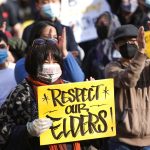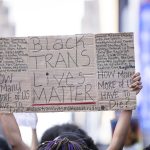This AAPI Heritage Month, we’re telling the untold stories of women, women of color and LGBTQ+ people. Subscribe to our daily newsletter.
The majority of Asian Americans feel unsafe or unwelcome because of their race, according to two sets of recently released data from prominent advocacy groups. The surveys, conducted separately by the Asian American Foundation and Stop AAPI Hate, which both work to address prejudice and violence against Asian American and Pacific Islanders (AAPI), show that many feel alienated in their communities, resulting in negative effects on mental health and emotional wellbeing.
Norman Chen, the chief executive of the Asian American Foundation, said that there is a continuing and alarming trend that the majority of Asian Americans do not feel safe or like they belong because of their race.
“Anti-Asian violence threatens our community and takes a toll in every part of our lives, from riding a public bus to attending school,” Chen said in a statement. “We can’t blame political rhetoric and the COVID-19 pandemic alone for anti-Asian sentiment. Historic stereotypes and prejudices towards our communities are persistent and deeply entrenched.”
Reports of attacks and discrimination against AAPI people surged with the start of the COVID-19 pandemic, with terms like “the China virus” feeding anti-AAPI sentiment. Accounts and video of attacks spread across the news or social media and left many people, particularly women and older people, feeling vulnerable and more hesitant to venture out.
Candice Cho, managing director of policy and counsel at AAPI Equity Alliance, notes that racial discrimination against Asians in the United States predates the pandemic. Even looking back at a 1992 report published by the U.S. Commission on Civil Rights, Cho said not much has changed when it comes to what forms of discrimination AAPI people face.
“The way that AAPIs are treated in places like schools and workplaces, in businesses, when they’re looking for housing and when they’re asking the government for help — it’s like that report from more than 30 years ago was written today,” Cho said. “They face this unfair treatment because of who they are.”
AAPI Heritage Month: Our legacies, our experiences, our future
This story is part of our AAPI Heritage Month coverage. From recommended reading to staff reflections and historical data, we’re focused on telling stories highlighting the past, present and future. Explore our work.
Cho said the prevalence of discrimination today is staggering: More than 11,000 acts of hate against the AAPI community were reported to Stop AAPI Hate, a coalition that tracks these incidents, since March 2020. In the coalition’s recent civil rights report, Cho said researchers honed in on acts of hate and discrimination that were also illegal. The report, released in May, draws on a survey of 1,331 Asian Americans and Pacific Islanders conducted from November 30 to December 22, 2022, in partnership with research organization NORC at the University of Chicago. The margin of error is 3.89 percentage points.
“If I’m at work and my supervisor calls me a racial slur and creates a kind of environment where I’m being targeted for my race, that’s illegal,” Cho said. “I think what’s remarkable about the latest report is that the extent of discrimination that our communities face is so large and that it’s already illegal under current laws.”
The Asian American Foundation also released its annual Social Tracking of Asian Americans in the United States (STAATUS) Index this month. The information was collected from February 9 to March 13, 2023, with a sample size of 5,235 Americans, including 1,330 Asian Americans. STAATUS also specifically polled Native Hawaiian and Pacific Islanders, but the sample sizes were too small for analysis. The margin of error for the entire sample is 1 percentage point.
Here are some of the highlights from both reports:
1 in 2 Asian Americans report feeling unsafe because of their race or ethnicity
Fifty-two percent of Asian Americans feel unsafe because of their race or ethnicity, a level of discomfort similar to Black (53 percent) and Latinx (47 percent) populations. According to the 2023 STAATUS Index, younger Asian Americans were more likely to feel unsafe than older populations.
Nearly half of AAPI people said they had experienced discrimination or unfair treatment that may be illegal
These feelings around a lack of safety are rooted in real-life experience of racial discrimination. Among AAPI people who said they had experienced discrimination in their lives, they overwhelmingly reported the unequal treatment was due to their race or ethnicity (82 percent), followed by discrimination due to gender identity (31 percent).
According to data on hate incidents gathered by Stop AAPI Hate, the types of harassment experienced by AAPI women and LGBTQ+ people are often gendered and racist. Verbal abuse combines slurs with comments about promiscuity, a reflection of how Asian women are hyper-sexualized in the media. Other verbal harassment contains references to cultural stereotypes of submission.
AAPI people reported experiencing discrimination in all sorts of areas of public life, but half said they were discriminated against at a business. Incidents occurred mostly at restaurants and retail stores.
Among people who reported experiencing discrimination when seeking government services, they most frequently cited negative experiences at the Department of Motor Vehicles (42 percent), when interacting with the police (31 percent) and at the post office (28 percent). But the bad behavior stems not only from government employees (63 percent), with fellow customers sometimes being the source of discriminatory behavior (41 percent).
Many reports of discriminatory behavior from schools involved teachers (43 percent), staff (35 percent) or fellow students (55 percent). Eighty percent of the incidents happened in public schools, where the majority of Asian American and Pacific Islander students are enrolled, according to the most recent data from the National Center for Education Statistics.
Nearly 4 out of 5 Asian Americans feel like they do not belong or are not accepted in the United States
Seventy-eight percent of Asian Americans do not fully feel that they belong and are accepted, levels similar to other people of color. Forty-three percent of White Americans said they felt like they did not belong.
Of those who do not feel like they belong, 58 percent of AAPI people said the top reason was from race-related discrimination, and 43 percent said it was because they don’t see people like them in positions of power.
According to the STAATUS Index, Americans writ large were more comfortable having an Asian American as a friend (84 percent) or health care worker (82 percent) than as a president or vice president (66 percent). Twenty-six percent of Americans couldn’t name a famous Asian American when asked. Vice President Kamala Harris finally cracked the top three most famous Asian Americans this year, but more than twice as many people named Jackie Chan — who, despite being an icon of American cinema, is based in Hong Kong.
When asked about how Asian-American women were portrayed in film and television, Americans brought up sexist stereotypes. Fifteen percent said Asian-American women were often cast in roles as a geisha or sex worker, whereas Asian-American men were often perceived to be in roles where they were a martial arts expert (28 percent) or a villain (25 percent).
These tropes of Asian-American women, including the highly sexualized “Dragon Lady” villain, have persisted throughout decades. In a 2021 op-ed for Washington Post, the actor Lucy Liu wrote of how her race impacts the way her roles are perceived: “If I can’t play certain roles because mainstream Americans still see me as Other, and I don’t want to be cast only in ‘typically Asian’ roles because they reinforce stereotypes, I start to feel the walls of the metaphorical box we AAPI women stand in.”
Additionally, 1 in 4 Americans said they believed Asian Americans were more loyal to their “country of origin” than the United States — a narrative the media perpetuates through boxing Asian-American women into highly aggressive roles where their sexuality is used as a weapon.
Only 15 percent of AAPI people have reported their experiences of discrimination to the relevant authority
Stop AAPI Hate identified three broad reasons Asian Americans don’t report their experiences with discrimination to relevant authorities: a lack of trust in institutional response; a lack of information and resources; and a fear of retaliation against them or their family. Among those who experienced discrimination but did not file a report, 52 percent said it was because reporting would not make a difference.
For those who did speak up, only about a quarter reported incidents to government agencies involving civil rights. Asian Americans most commonly said they reported details to work supervisors or human resources departments (46 percent), with some saying they reached out to the police or lawyers (38 percent). Of those who did report, 60 percent said the process was difficult.
Only half of AAPIs who filed a report were satisfied with the outcome of the case. Actions taken after reporting varied widely, with 24 percent saying no action was taken. Eleven percent said the offender took negative action against them or their family, and seven percent said the government took negative action against them, such as deporting or taking away benefits.
Discrimination has tangible negative effects on Asian Americans
Discrimination disrupts the everyday lives of AAPI, causing stress and straining relationships. Thirty-one percent of AAPI who experienced discrimination said it impacted their sense of safety and 45 percent said it affected their sense of belonging.
Nearly a third said they had actively changed their behavior after experiencing discrimination, including taking action like changing schools or jobs.
AAPI people put the most trust in community organizations and government authorities when it comes to educating and taking action about their civil rights
Sixty-four percent of AAPI people said knowledge about their civil rights would make them more comfortable reporting a violation, as well as an understanding that no harm would come to them or their families if they filed a report.
When asked about preferences on how to learn more about their civil rights, AAPI people were most likely to say they wanted to learn from community organizations who were focused on Asian-American and Pacific Islander populations or from focused government agencies like the Department of Justice.
Correction: An earlier version of this article misquoted Candice Cho's remarks about street harassment. The incorrect quote has been removed.




